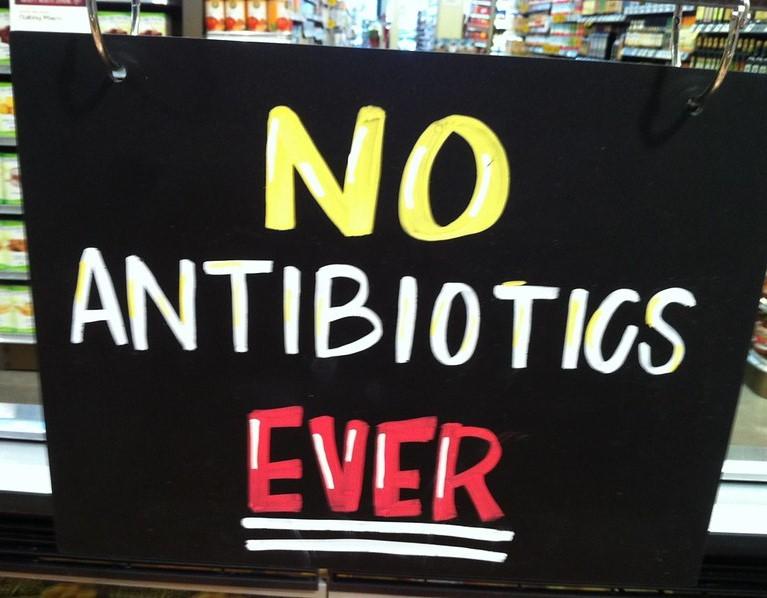The US Department of Agriculture (USDA) said yesterday that it will take steps to strengthen animal-raising claims on meat labels, including those that highlight no or limited antibiotic use.
Department officials said the move comes in response to petitions, comments, and letters that the USDA's Food Safety and Inspection Service (FSIS) has received regarding its oversight of voluntary marketing claims that highlight how animals for meat and poultry products are raised. These claims, which include "grass-fed," "free-range," and "raised without antibiotics," must be approved by FSIS before they can be added to packaged meat labels.
What critics are concerned about is the approval process. While producers who want to market their meat using labels that suggest their animals were not given antibiotics must provide the USDA with documentation to support those claims, the agency does not currently conduct testing to verify the claims. The USDA says it plans to address the issue.
"USDA is taking action today to ensure the integrity of animal-raising claims and level the playing field for producers who are truthfully using these claims, which we know consumers value and rely on to guide their meat and poultry purchasing decisions," Agriculture Secretary Tom Vilsack said in a USDA news release.
Critics cite insufficient testing, lack of substantiation
The veracity of claims regarding antibiotic use, long questioned by experts, were raised in two studies published in April 2022. The first, by the animal welfare group Farm Forward, found antibiotics and other drugs in meat certified as having "no antibiotics ever" and sold at Whole Foods stores.
The second, led by researchers with George Washington University's Antibiotic Resistance Action Center and published in the journal Science, found that, in 42% of USDA-certified "raised without antibiotics" feed yards at a single cattle slaughter facility, at least one animal tested positive for antibiotics.
While FSIS conducts testing—in roughly 7,000 animals a year—for antibiotic residues in meat under the National Residue Program, those tests are looking to see whether antibiotics in animal tissue exceed maximum residue limits set by the Food and Drug Administration. Those tests are meant to determine whether the meat is safe for consumers to eat, not verify whether an animal has ever received antibiotics.
These claims must be backed by empirical testing to validate producers who are truthfully using these claims and protect consumers from false and misleading labels.
Advocates for more humane farming practices have also raised questions about the veracity of claims like "humanely raised" and "ethically raised." A 2023 report from the Animal Welfare Institute found that, of 97 meat and poultry products they investigated, more than 80% lacked sufficient substantiation of their claims. That prompted a group of US senators to write a letter to FSIS in March asking the agency to explain how companies are required to substantiate their claims, and what resources might help FSIS evaluate animal-raising claims.
"The USDA has an obligation to ensure consumers have the information necessary to make informed choices about the products they purchase and that hardworking farmers and producers are able to compete on a level playing field," the letter said.
Potential additional testing
According to the USDA news release, FSIS will conduct a sampling project with the USDA's Agricultural Research Service to assess antibiotic residues in cattle destined for the "raised without antibiotics" market. Based on the results, FSIS will then decide whether meat producers will need to submit laboratory testing results to verify the label. The USDA also says it will encourage the use of third-party certification to verify the claims.
"Together these actions will be used to guide potential rulemaking on animal-raising claims," the agency said.
Antibiotic Resistance Action Center founder and co-director Lance Price, PhD, said he welcomed the USDA's announcement.
"Companies know consumers are moved by animal rights so they often link reduced antibiotic use claims to improved animal welfare," Price said in a statement. "These claims must be backed by empirical testing to validate producers who are truthfully using these claims and protect consumers from false and misleading labels."
Farm Forward executive director Andrew deCoriolis said testing is essential for ensuring claims about antibiotic use are truthful, and questioned whether encouraging food producers to submit more evidence or seek third-party certification is enough.
"Neither of those are binding requirements, and given how widespread deception is on grocery store shelves today, anything less may end up missing the mark," he wrote on the group's website.




















